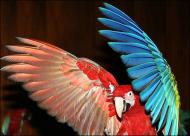
| Amazon Expedition Travel
|
 |
|
|
|

| User Functions
|
|
|
Don't have an account yet? Sign up as a New User
|
|

| Help support this site!
|
|
|
Help support this site... your donations are needed to support research, conservation, and rescue efforts.
|
|

|
 |
| Cameroon rescues 1,200 parrots from trafficking |
 |
Thursday, February 14 2008 @ 10:26 PM UTC
Contributed by: MikeSchindlinger
Views: 6365
|
 Jan 23, 2008
Jan 23, 2008
 NAIROBI (AFP) — Cameroon wildlife authorities have rescued at least 1,200 African Grey parrots being trafficked to Bahrain and Mexico for the exotic pet trade, an animal welfare group said on Thursday. NAIROBI (AFP) — Cameroon wildlife authorities have rescued at least 1,200 African Grey parrots being trafficked to Bahrain and Mexico for the exotic pet trade, an animal welfare group said on Thursday.
Kenya-based Wildlife Direct said Cameroon's ministry of forests and wildlife intercepted two shipments at Douala International Airport that were carrying the parrots to their destination.
It did not give the day they were intercepted, but said the birds are currently being cared for at Limbe Wildlife Centre (LWC), situated in the small fishing town of Limbe at the foot of Mount Cameroon.
In 2006, Cameroon had a legal quota of birds that it could export, but lost it temporarily last year after a ban was imposed on trading of birds owing to the global outbreak of avian flu.
"The ban on the movement of birds has been lifted (although Cameroon's quota for 2008 is zero birds), so the traders wanted to use up their 2006 quotas," said LWC chief veterinarian Felix Lankester.
"This is a tragic story of wildlife being exploited for the international trade in exotic pets, one of the most lucrative illegal trades in the world ... How many other shipments of birds make their way out of the country undetected we can only dread to imagine," he added.
Wildlife Direct chief Emmanuel de Merode said the African Grey parrot is in decline due to a growing and highly lucrative harvest for the pet trade from West and Central Africa.
"The species may be threatened with extinction in its natural environment unless the trade is subject to strict enforcement," he added.
The African Grey parrot is listed on CITES appendix II which restricts trade of wild caught species, because wild populations cannot sustain trapping for the pet trade. It is popular as a pet, partly because of its ability to imitate speech.
http://afp.google.com/article/ALeqM5isK4Yk6l3MXQ0p3_lefjeSE8bPOQ
|
|
|
|

|

|

